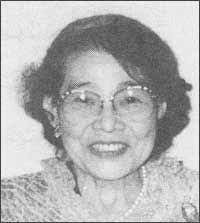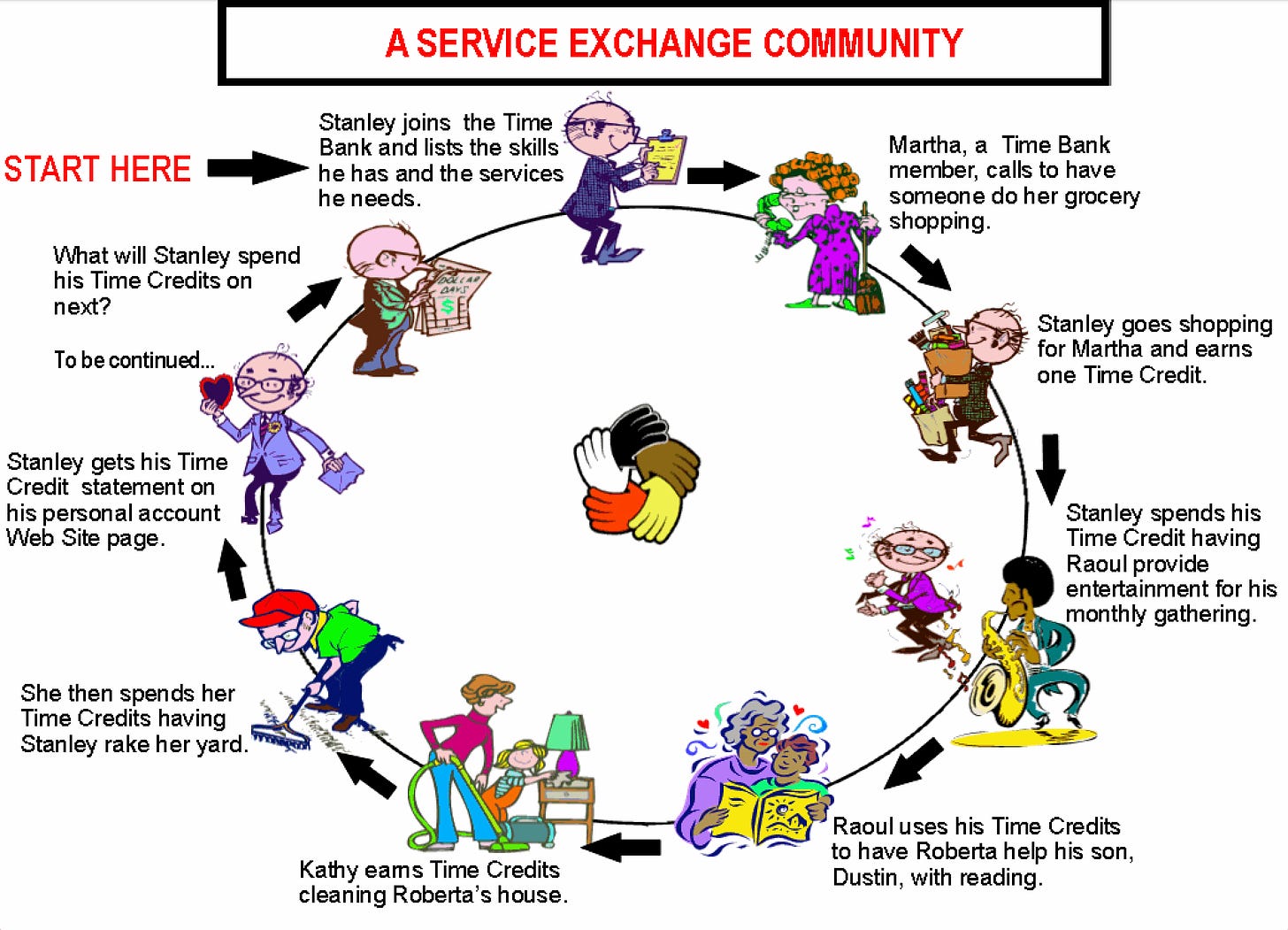Kindness as an International Currency
How TimeBanking can become the safety net for our current failing market-based economy.
The first inspiration for TimeBanking occurred in the early 1940s when a young mother living in Japan, Teruko Mizushima, collapsed from exhaustion. Her husband had left at the onset of the Asia-Pacific War after Japan attacked Pearl Harbor, and she was left to manage the household and their infant daughter.
Because of this exhaustion, Mizushima began to enquire about people’s use of time and the importance of people having time for their self-care. She felt a deep sense of “not owning her own time” and felt women, particularly the elderly, could use a different method of valuing time and their efforts. From this introspection, Mizushima would begin the manifestation of the world’s first TimeBank.
It was in 1950 that Mizushima submitted an essay titled “Women’s Ideas for the Creation of a New Life,” and she ultimately received first place in what was called “The Newspaper Companies’ Prize,” attracting nationwide media attention.
She envisioned a time-based currency that values everyone's contributions equally: one hour equals one service credit. A reciprocity-based work trading system in which time is the currency. In this system, when one person volunteers to work for another person, they are credited for that time, which they can redeem for a service from another volunteer at a later date.
For example, if you spend an hour walking a TimeBank member’s dog, you will accrue an hour in your TimeBank account. You can spend that hour on guitar lessons, electrical work, or garden help with another TimeBank member. This is much more flexible than bartering.
In 1973, Mizushima’s vision became the world's first TimeBank, drawing on ideas she had been developing since the 1940s. Within six years of Mizushima’s launching her visionary concept known as the Volunteer Labour Bank (VLB), it expanded across Japan, supporting homemakers and the elderly.
Since her unexpected death in 1996, the VLB membership has declined, but the concept had already begun spreading around the globe in various ways.
In the 1980s, Mizushima’s work would inspire a young American, Dr. Edgar Cahn, who had been attending the London School of Economics. During this time, Cahn was witnessing a perfect storm brewing; the baby boomer generation becoming older, social service programs drying up, and the decrease in the dollar’s value. In addition, Cahn realized that over the decades, the core economy - relying on family, neighbors, and friends - had been replaced by the dollar economy, paying with cash for services and skills.
Paying for such services worked fine for decades, but inflation was gaining momentum, services were becoming more expensive, and individuals, particularly the elderly, were forgoing assistance they would have otherwise received for free from the “core economy.”
In response, Cahn founded and launched America’s first TimeBank in 1995, called TimeBanks USA.
Because of my volunteer work in Nevada City, CA, around community self-reliance, I became familiar with TimeBanking in 2005. But at that time, it required a lot of paper and administrative work, which I had no interest in. It was in 2014 that I realized Edgar Cahn’s TimeBanking had been expanded to online due to software developer Stephen Beckett’s efforts in Portland, Maine, and became known as the “hOurWorld Co-op.”
At the same time, I was watching the instability of our economy and always felt uncomfortable that we had no backup plan if the dollar ever collapsed.
When I found that TimeBanking had moved online, I immediately signed up, designed a website, launched our local TimeBank, HourNevadaCounty.org, and began promoting how to TimeBank throughout my local community.
What I love most about TimeBanking is that everyone’s time is seen as equal. Whether you are a dog walker, a seamstress, a house painter, or a musician, your time is seen as equally valuable.
It is a system that reweaves the frayed fabric of the community we so desperately need today. For instance, if I am laid up after surgery, members of the local TimeBank can make me a meal, walk my dog, or go shopping for me. If I’m too old to climb a ladder to clean my gutters, I can have somebody more agile within the TimeBank do that for me.
And TimeBanking is not limited to my immediate community. I can use my accrued hours to have a TimeBank member drive me to our nearby airport. I can then fly into Portland, Oregon, and have a member of their local TimeBank pick me up, take me to an Airbnb owned by a TimeBank member, and exchange my night’s stay with the additional TimeBank hours I had been accumulating.
TimeBanking is a paradigm shift around currency. We have been led to believe that for us to receive a service or skill, we need a dollar or a banking system that keeps track of our zeros and ones online. We don’t realize that the only reason dollars and online banking work are because somebody is keeping an accounting of those zeros and ones. If we can keep an accounting of a fiat currency, gold, silver, or cryptocurrencies, we certainly can keep an accounting of kindness. But we never talk about kindness as a potential currency asset.
The possibilities are endless. It allows us to leverage the dollars we do have to pay for our bills in the market-based economy, such as rent, car payments, and health insurance. It’s also inflation-proof. Everybody can use it. And it is needed now more than ever as we watch the dollar's value dry up.
We have few options that are so personally empowering and easily actualized… the time for TimeBanking is now.
Know anyone interested in TimeBanking? Send them this post!








Now that's a sustainable currency! Thanks 🙏 for sharing
Great idea!